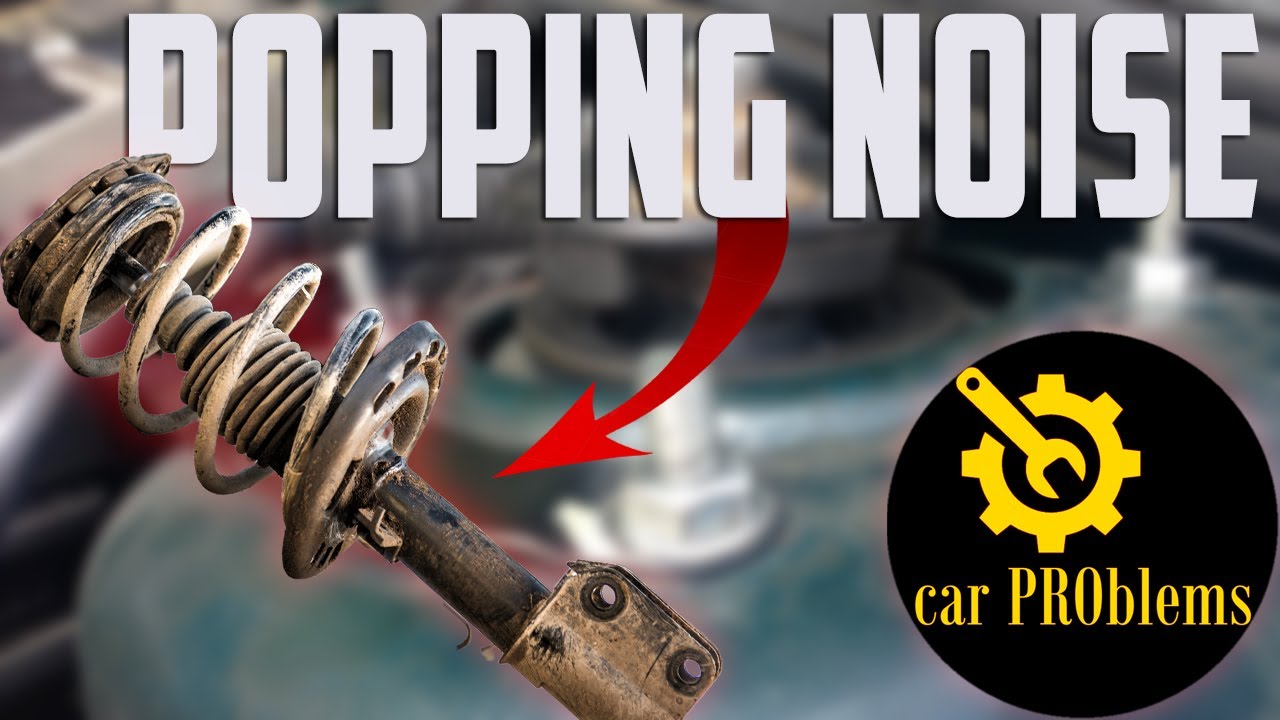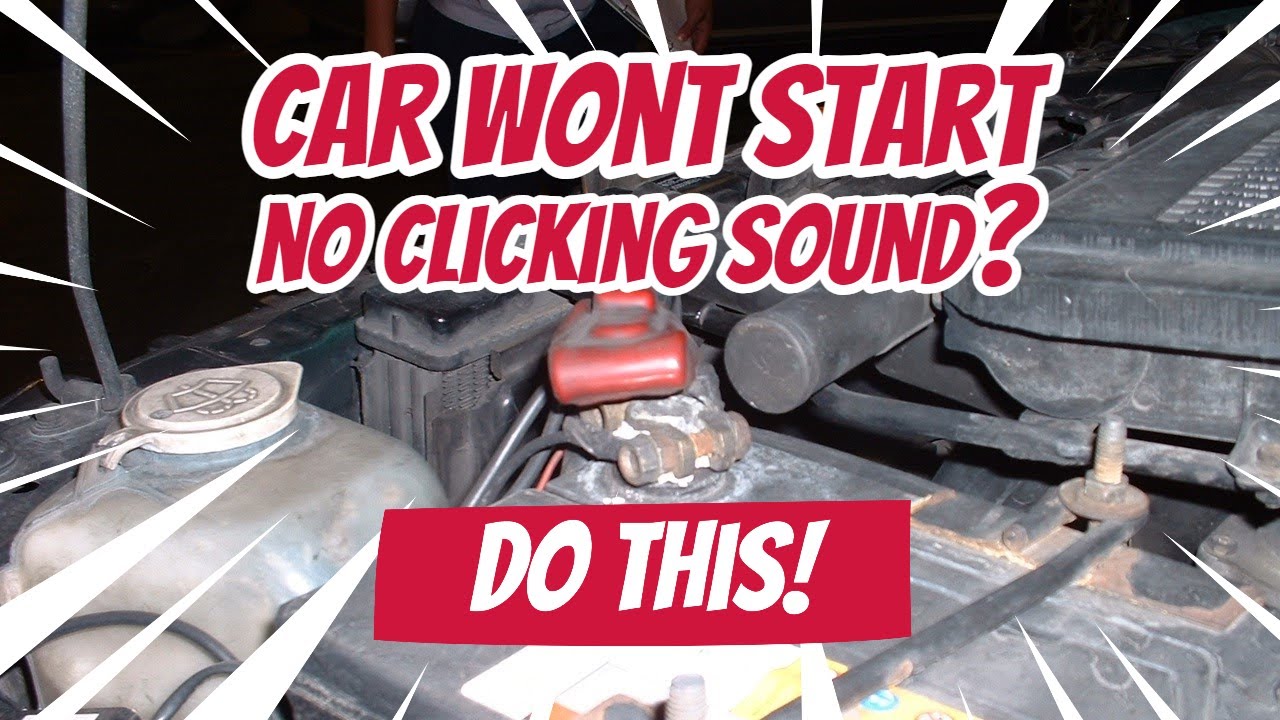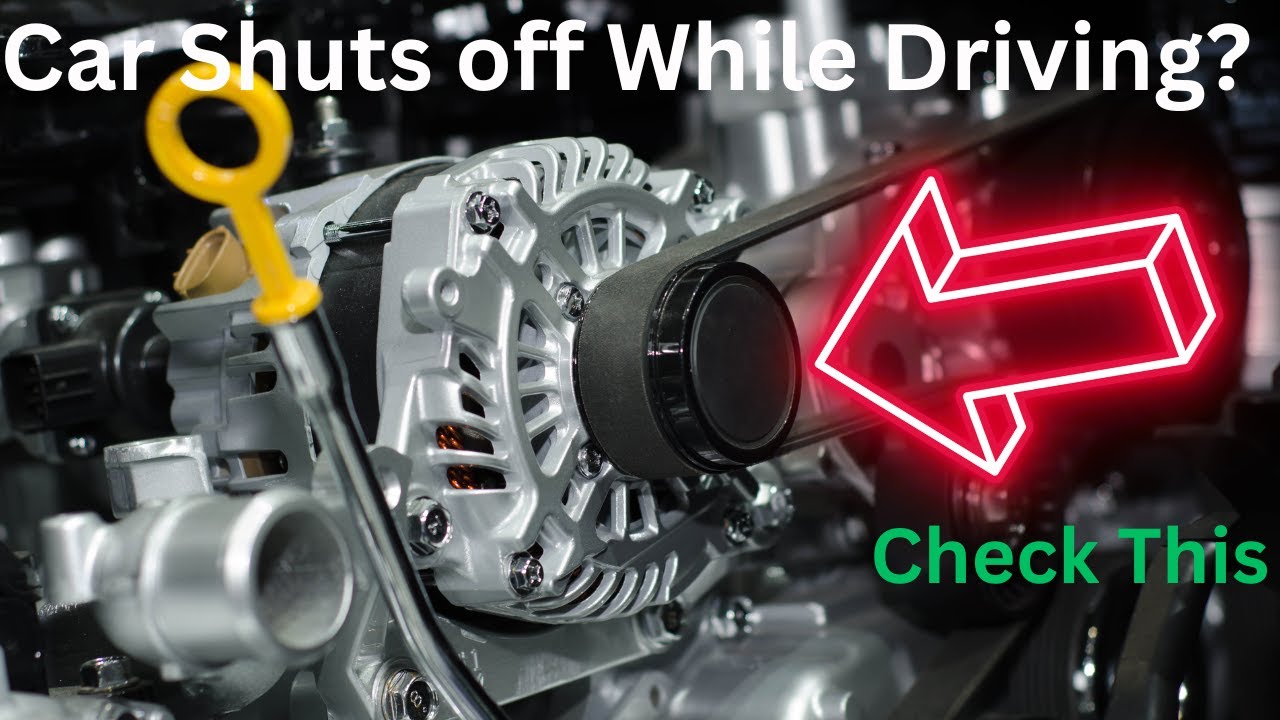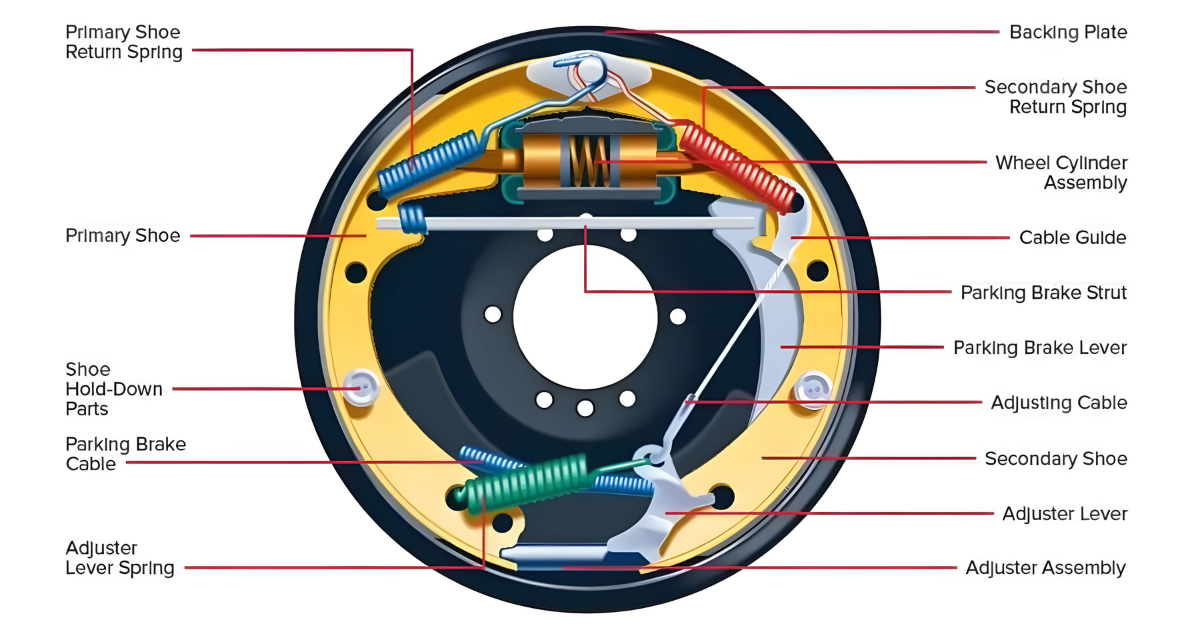Have you ever been driving down the road, and suddenly your car starts to jerk and shake when you apply the brakes? It’s a frightening and potentially dangerous situation, but have you ever stopped to wonder why it might be happening? Is it a problem with the brakes themselves, or is there something else going on under the hood? Could it be related to your driving habits, or is it simply a sign of wear and tear on your vehicle?
Car jerking can be triggered by a variety of causes, from common wear and tear on the brake pads, rotors, calipers, hose, booster, and master cylinder to inadequate fluids or misaligned wheels. Identifying the root cause of the car’s jerking is critical so that you can take proactive measures to tackle it.
Now, let’s take a deep dive into what might cause your car to jerk when you brake and discover effective solutions that will help you solve this pesky problem. Cast aside all worries and get ready to explore the fascinating world of automotive repairs!
Causes Related to Braking System Mechanics
The malfunction of the braking system can be a major factor in car jerking, especially when traveling at higher speeds. These mechanical failures in the brake system are dangerous as they result in decreased stopping power and sudden jerks that put drivers at risk. The following problems can be associated with breaking the system mechanics.
Worn Brake Pads
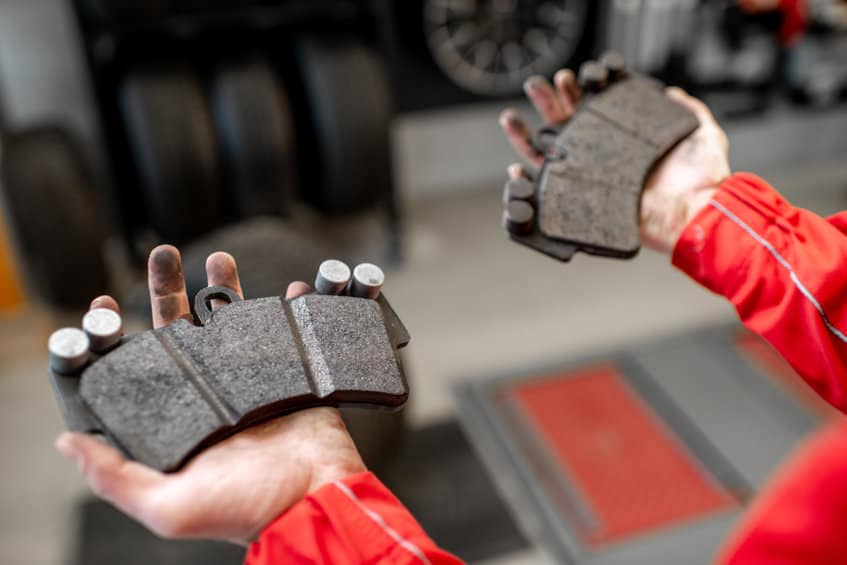
If the brake pads have been extensively used, your car’s braking system will not be able to function effectively, and you may experience a jerking sensation when applying the brakes. Additionally, if there is dirt or debris build-up under the rotor due to worn-down brake pads, your vehicle could vibrate while driving – an unpleasant reminder that it’s time for new brake pads.
How to Fix?
The best way to prevent car jerking caused by worn-out brake pads is to regularly check your car’s brakes and replace them as necessary. Keeping an eye on the wear of your brake pads and replacing them before they become too thin will help prevent any jerking or strange noises when you apply the brakes. Additionally, having a mechanic perform regular inspections of your braking system can also help keep it in good working order.
Worn Rotors
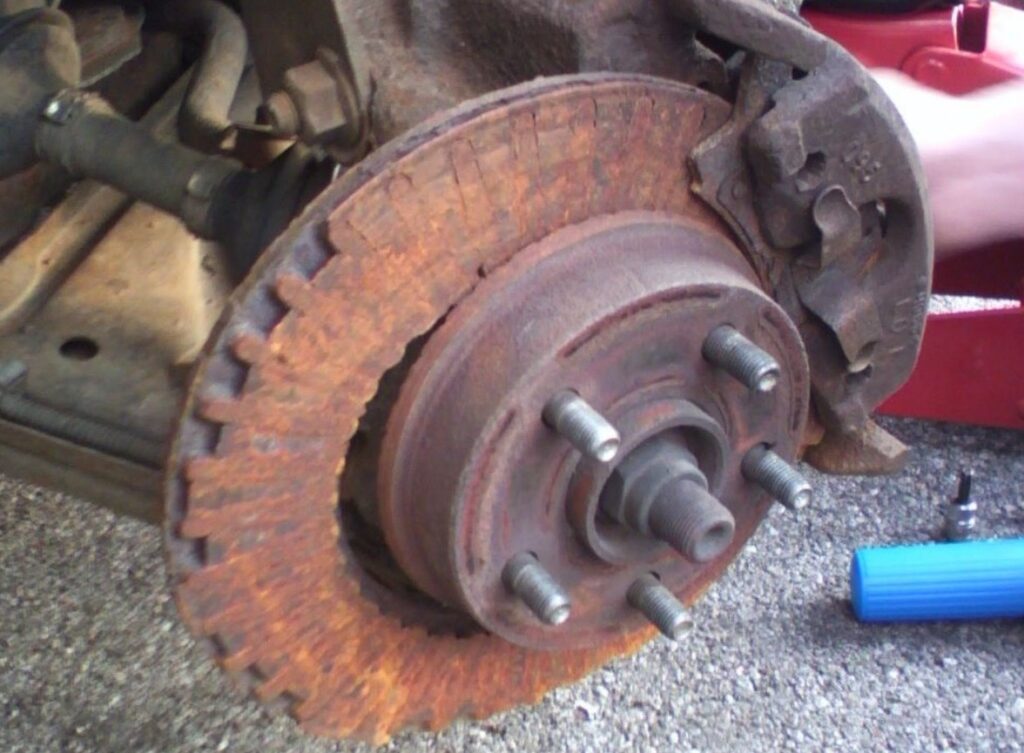
Your car’s disc brakes work by using friction between brake pads and rotors. If the rotor has been spun on a lathe in the past, then it is more likely to become deformed over time. Consequently, when applying your brakes, this thinning of the rotor due to excessive heat or cooling can produce an abrupt jolt feeling. Inadequately worn-down rotors may not be able to stop your vehicle effectively either, thus making it jerk whenever you apply those breaks!
How to Fix?
Incorporate only the best quality brake pads and maintain your rotors lubricated and clean for maximum effectiveness. If your rotor condition has severely deteriorated, take action quickly by replacing them immediately!
Faulty Brake Calipers
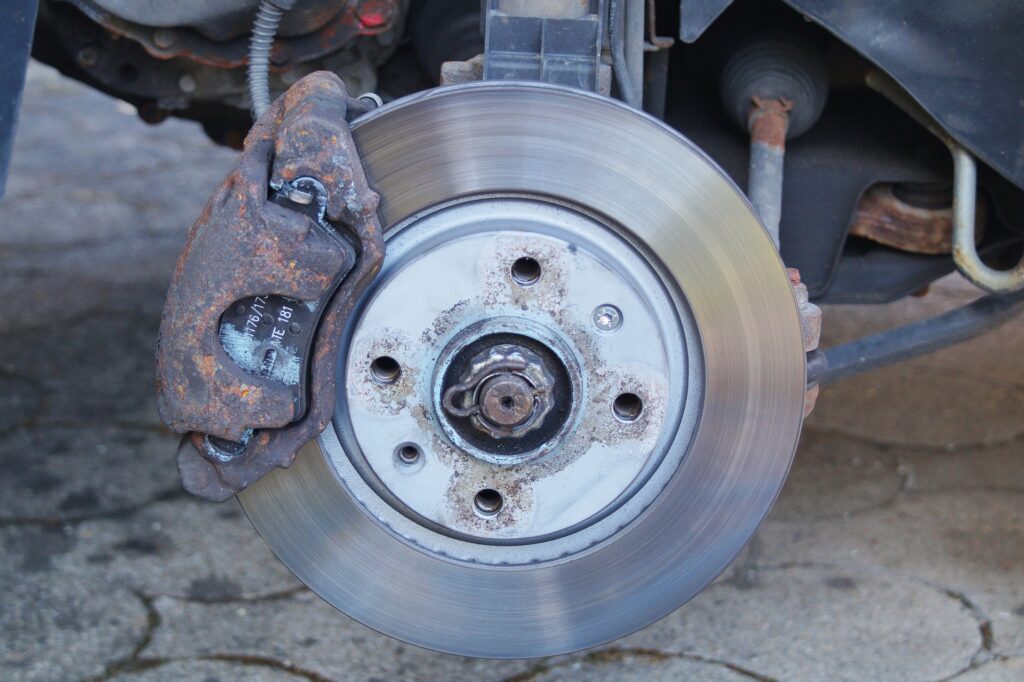
Malfunctioning brake calipers could lead to inadequate pressure being delivered to the brake pads, resulting in a jerky braking experience. Additionally, when the brake pads are worn out and need replacement, your car may jolt violently with every press of the pedal. Usually, these issues arise due to brakes jamming into their gear teeth, and you might hear grating or chattering noises commensurate with such problems.
How to Fix?
Car jerking caused by Faulty Brake Calipers can be fixed by replacing the faulty caliper with a new one. Begin by taking off your wheel and disconnecting the brake line from the caliper. Afterward, be sure to bleed your brakes in order for all air bubbles to escape from your braking system. Finally, when everything has been installed correctly, take it out on a test drive and enjoy smoother driving!
Loose or Worn Brake Hose
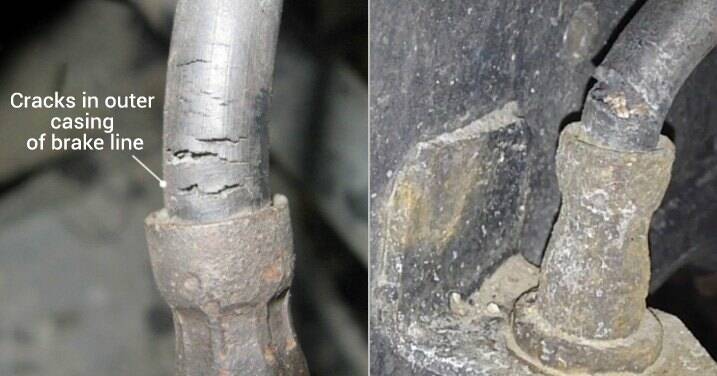
Malfunctions in the brake system can occur if the hose is faulty or detached, which may cause a jerky stop. If that’s the case, hydraulic fluid will start to leak from its container and reduce the level of pressure being transmitted through your brakes. This leads to an impaired ability to halt your vehicle as well as a spongy feeling when you press the pedal.
How to Fix?
First, identify the issue to fix the car jerking linked to a worn or loose brake hose. Carefully check every element of your braking system and its components, such as lines and hoses, for any recognizable wear like cracking, bulging, or leakage.
If you come across an affected hose, immediately swap it with one that is new and compliant. Additionally, make sure all attachments are firmly secured and free from rust or corrosion before taking off again!
Issues With the Electrical and ABS
Taking advantage of the most advanced technology available, modern vehicles are now equipped with an Anti-Lock Braking System (ABS). ABS is a sophisticated electronic control system that stops your brakes from locking up and losing their grip when you’re driving on slippery surfaces.
When the ABS (Anti-Lock Braking System) is activated in a vehicle, it may cause a noticeable jerking sensation when the vehicle comes to a stop.
How to Fix?
This impact is nothing to be worried about if you have attempted to stop abruptly, especially in rainy weather. However, if the ABS system in your car starts acting up at random stops, you’ll need to get it diagnosed further and visit a professional because it’s a really difficult problem to fix.
Faulty Brake Booster
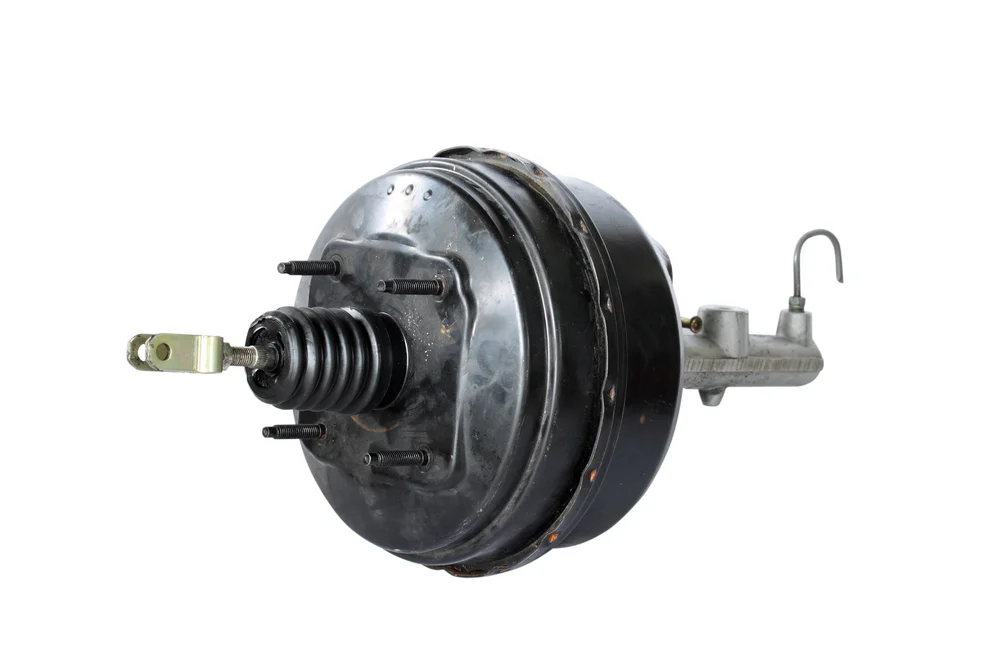
An unreliable braking system can be caused by a defective brake booster that is struggling to improve the pressure from the brakes. If your car vibrates when you hit them, it’s likely because of an issue with its vacuum-assist brake booster.
This device uses air pressure created through depression in the air after pressing down on the pedal and relies upon this gap for controlling a diaphragm inside it. Consequently, if there is harm present within this diaphragm, jarring while using brakes could occur, making safer driving nearly impossible!
How to Fix
Troubleshooting car jerking caused by a faulty brake booster requires you to identify the issue accurately. To do this, scanning the brakes for any harm, examining the master cylinder’s performance, and testing for air in the system are necessary steps. Afterward, if you have identified and fixed it correctly – don’t forget to expel any residual air from your vehicle before taking on that journey!
Worn Brake Shoes
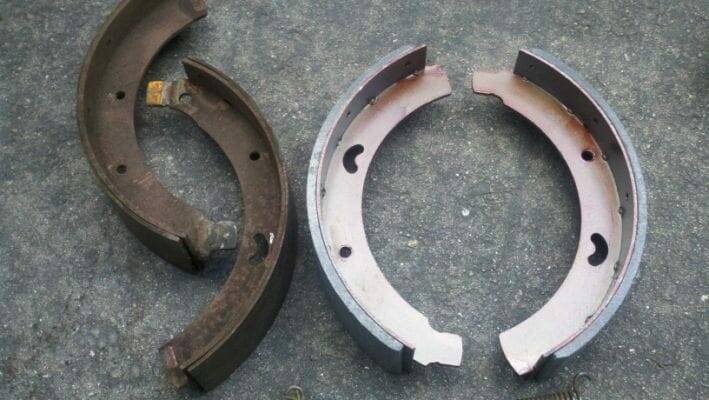
Brake shoes are curved pieces of metal featuring friction material attached to one side. When you apply the brakes and your shoes are worn, they may not be able to bring your vehicle to a stop as efficiently – resulting in an unsteady jerking. You will have to apply more pressure to your brakes in order for them to stop sufficiently; this makes driving increasingly dangerous as time passes.
How to Fix
Car jerking caused by worn brake shoes can be repaired by replacing the brake shoes. This is typically done as a part of routine maintenance. Still, if you notice unusual vibrations or noises coming from your brakes, it may be time to have them inspected and replaced if necessary.
Faulty Brake Master Cylinder
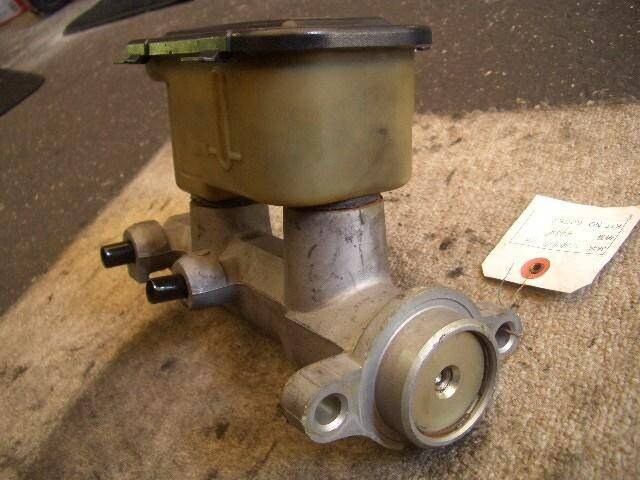
The brake master cylinder, also known as the hydraulic pump, is vital for providing pressure to the brake circuit. If it malfunctions in any way, you may notice an immediate change – such as a spongy and mushy feeling from your pedal or even jerking when braking. It’s important not to ignore these symptoms because if left unattended, they can worsen over time, eventually leading to the leaking of fluid or worse!
How to Fix
To get rid of the jerking due to a malfunctioning brake master cylinder, first, make sure it is properly installed. After that, examine and replace any contaminated brake fluid as needed. Subsequently, bleed your brakes and inspect for air bubbles present in the system.
If these steps don’t solve it, then you may have no choice but to install an entirely new master cylinder – doing so ought to bring back expected braking and erase those annoying jolts once more!
Loose Brake Components
Unsecured brakes can lead to weakened stopping power and cause your car to jolt unexpectedly when you need it the most. Air obstruction in brake lines is typically what causes such an issue, resulting in an unstable braking experience. If any air manages its way into these components, expect jerky motions due to inconsistent braking force being applied.
How to Fix?
In order to ensure optimal braking power, get rid of any trapped air in the brake system’s pipes by bleeding them out! Secure any loose components by tightening or replacing them with new ones.
Causes Related to the Brake Fluids
When your car’s brake fluid is not functioning correctly, you may experience jerks while slowing down or coming to a halt. Malfunctioning of the brake fluid could be rooted in any number of underlying issues.
Poor Quality Brake Fluid
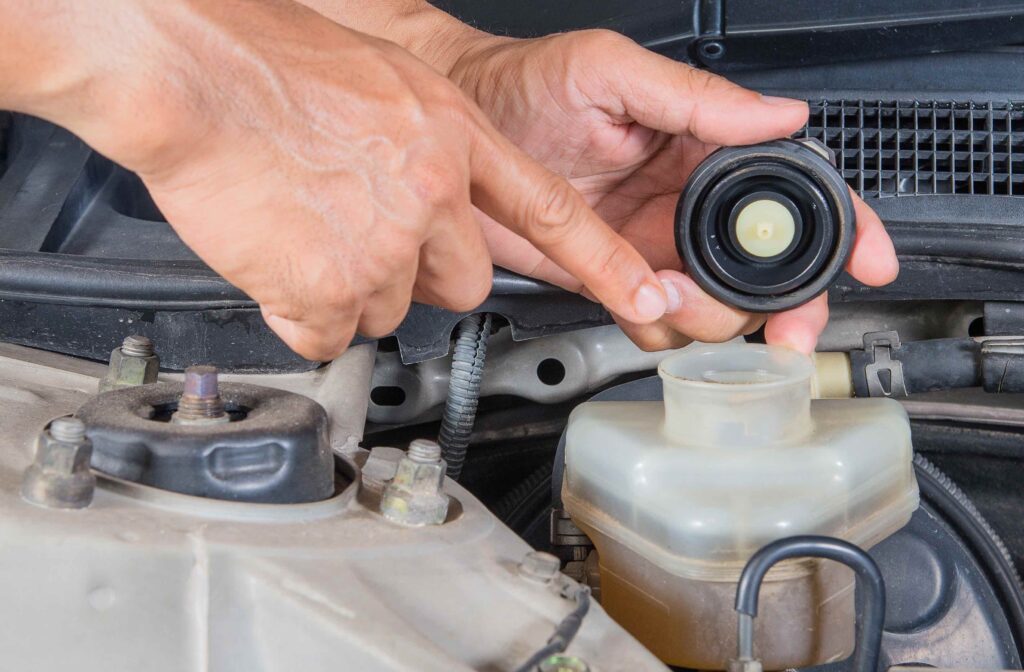
Nowadays, most vehicles are equipped with brakes that operate using a closed hydraulic system. When the driver hits on their brake pedal, this triggers cylinders in (drum brakes) to react accordingly and sends out hydraulic fluid through lines into individual pistons from the master cylinder.
When brake hydraulic fluid becomes tainted with water, dirt, and other foreign matter, you’ll experience reduced braking performance, which can be significantly dangerous. Suddenly stopping when trying to slow down or come to a full stop is an all too common occurrence if the brake fluid is contaminated.
How to Fix?
Low-grade brake fluid can cause your car to jerk, as the friction coefficient between components is decreased and leads to a lack of responsiveness from the brakes. You can prevent this problem by
- Consistently stocking up on high-grade OEM-compliant brake fluid – its greater lubricity ensures smooth, dependable braking performance.
- Replacing brake fluid according to your vehicle’s recommended service intervals.
- Having your brakes regularly serviced by an experienced technician and inspected for any signs of wear or damage.
- Keeping all of the components clean and free of debris so they can function correctly.
Incorrect Brake Fluid Level
Dangerous consequences can arise if the brake fluid level is too low – not only a lack of effectiveness in your brakes but an uncomfortable jerking sensation when braking. Brakes depend on hydraulic liquid for their pistons and pump to function properly. Without sufficient brake fluid in the system, you won’t be able to experience optimal performance from your brakes, an issue that should never be taken lightly!
How to Fix?
For reliable and safe braking system performance, it is important to change the brake fluid regularly. Even better, with proper maintenance of your vehicle, you can prevent any leakage from happening in the first place!
Causes Related to the Wheels and Suspension
When your car’s wheel alignment and suspension are not running in peak condition, you may experience a jerking sensation when braking. This can be the result of numerous reasons, such as unequal tread wear because of misalignment, loose parts or components, and faulty tire pressure – it all adds up to an unpleasant ride!
Misaligned Wheels
When your wheels are out of alignment, they will be unable to stop the car as effectively – causing it to jerk when you brake. If they’re not aligned properly, one tire may have reduced traction than its opposite counterpart. Resultantly, this impacts how efficiently the brakes provide pressure across both sides in an even manner. To ensure a safe and smooth driving journey, consider regularly maintaining wheel alignment on your vehicle!
How to Fix?
You can fix this issue by having the four wheels professionally aligned by an experienced expert who has the necessary knowledge and tools to measure suspension angles for each wheel correctly. This process will guarantee improved handling, enhanced fuel economy, as well as a smoother overall driving experience!
Worn or Damaged Tires
If the tread on your tires is insufficient, you’re in for a bumpy ride when driving at high speeds. This is especially true if you happen to find yourself motoring through slick, icy roads – an automobile equipped with worn or uneven tires can be dangerous and cause jerky movement. To ensure your safety while traveling, make sure to conduct thorough tire wear checks before assuming that the issue lies within your brakes!
How to Fix?
Car jerking caused by worn or damaged tires can easily be remedied by replacing the old ones with brand-new ones. Repairing them may sometimes be an option, but it is usually better to purchase a new set as they are generally cost-efficient, and you won’t have to worry about any issues that may arise from having repaired tires.
Worn Bushings in the Steering and Suspension
There are numerous bushings used in the front end of common vehicles to reduce vibrations, including:
- Control arm bushings
- Shock absorber bushings
- Steering rack bushings
Unfortunately, these components can become worn over time, causing an increase in vibration when braking. This amplified shaking is noticeable both inside and outside the vehicle.
How to Fix?
To fix this issue, you’ll need to replace the worn bushings. It’s important to note that replacing worn bushings in the steering and suspension is a job that requires a certain level of mechanical aptitude. Here’s how you can do that:
- First, you’ll need to locate the worn bushings. These are typically found in the control arms, tie rods, and sway bar links.
- Once you’ve located the worn bushings, you’ll need to remove them. This may require the use of special tools, such as a ball joint separator or a tie rod end puller.
- Next, you’ll need to install the new bushings. This may require pressing them into place using a hydraulic press. Alternatively, you can use a hammer and a block of wood to gently tap the new bushings into place.
- Finally, you’ll need to reassemble the steering and suspension components and properly torque all of the fasteners to the manufacturer’s specifications.
Conclusion
Any of the above-mentioned issues could cause a jerky feeling when you press down on the brakes – and identifying it yourself may be tricky. It’s likely to require diagnostic tools at a garage, as it’s related to brake discs or pads that can’t usually be seen with the naked eye. This problem is both annoying and potentially dangerous while driving, so don’t hesitate if you think something isn’t quite right!


